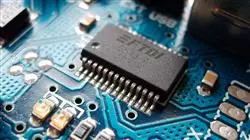University certificate
The world's largest faculty of information technology”
Introduction to the Program
If you are looking for quality education that will help you specialize in one of the fields with the most professional prospects, this is your best option”

Advances in telecommunications are happening all the time, as this is one of the fastest evolving areas. It is therefore necessary to have IT experts who can adapt to these changes and have first-hand knowledge of the new tools and techniques that are emerging in this field.
This Postgraduate certificate in Basic Electronics and Instrumentation addresses the complete range of topics involved in this field. Its study has a clear advantage over other programs that focus on specific blocks, which prevents students from knowing the interrelation with other areas included in the multidisciplinary field of telecommunications. In addition, the teaching team of this educational program has made a careful selection of each of the topics of this program to offer students the most comprehensive study opportunity possible and always linked to current events.
This program will provide students with the keys to master the basic concepts of linear systems, electrical circuit theory, electronic circuits, the physical principles of semiconductors and electronic devices. Specifically, students will be taught to use the necessary instrumentation in the field of electronics.
This program is aimed at those interested in achieving a higher level of knowledge in Basic Electronics and Instrumentation. The main objective is for students to specialize their knowledge in simulated work environments and conditions in a rigorous and realistic manner so they can later apply it in the real world.
Additionally, as it is a 100% online program, the student is not constrained by fixed timetables or the need to move to another physical location, but can access the contents at any time of the day, balancing their professional or personal life with their academic life.
Do not miss the opportunity to take this Postgraduate certificate in Basic Electronics and Instrumentation with us. It's the perfect opportunity to advance your career"
This Postgraduate certificate in Basic Electronics and Instrumentation contains the most complete and up-to-date program on the market. Its most notable features are:
- The development of practical cases presented by Basic Electronics and Instrumentation experts
- The graphic, schematic, and practical contents with which they are created, provide scientific and practical information on the disciplines that are essential for professional practice
- Practical exercises where self-assessment can be used to improve learning
- Its special emphasis on innovative methodologies in Electronics Therapy and Basic Instrumentation
- Theoretical lessons, questions to the expert, debate forums on controversial topics, and individual reflection assignments
- Content that is accessible from any fixed or portable device with an Internet connection
This Postgraduate certificate is the best investment you can make when choosing a refresher program to expand your existing knowledge of Basic Electronics and Instrumentation”
The teaching staff includes professionals from the field of design, who bring their experience to this specialization program, as well as renowned specialists from leading societies and prestigious universities.
The multimedia content, developed with the latest educational technology, will provide the professional with situated and contextual learning, i.e., a simulated environment that will provide immersive education programmed to learn in real situations.
This program is designed around Problem-Based Learning, whereby the professional must try to solve the different professional practice situations that arise during the academic year. To do so, professionals will be assisted by an innovative interactive video system created by renowned Basic Electronics and Instrumentation experts
This Postgraduate certificate has the best didactic material, which will allow you a contextual study that will facilitate your learning"

This 100% online Postgraduate certificate will allow you to combine your studies with your professional work"
Why study at TECH?
TECH is the world’s largest online university. With an impressive catalog of more than 14,000 university programs available in 11 languages, it is positioned as a leader in employability, with a 99% job placement rate. In addition, it relies on an enormous faculty of more than 6,000 professors of the highest international renown.

Study at the world's largest online university and guarantee your professional success. The future starts at TECH”
The world’s best online university according to FORBES
The prestigious Forbes magazine, specialized in business and finance, has highlighted TECH as “the world's best online university” This is what they have recently stated in an article in their digital edition in which they echo the success story of this institution, “thanks to the academic offer it provides, the selection of its teaching staff, and an innovative learning method aimed at educating the professionals of the future”
A revolutionary study method, a cutting-edge faculty and a practical focus: the key to TECH's success.
The most complete study plans on the university scene
TECH offers the most complete study plans on the university scene, with syllabuses that cover fundamental concepts and, at the same time, the main scientific advances in their specific scientific areas. In addition, these programs are continuously being updated to guarantee students the academic vanguard and the most in-demand professional skills. In this way, the university's qualifications provide its graduates with a significant advantage to propel their careers to success.
TECH offers the most comprehensive and intensive study plans on the current university scene.
A world-class teaching staff
TECH's teaching staff is made up of more than 6,000 professors with the highest international recognition. Professors, researchers and top executives of multinational companies, including Isaiah Covington, performance coach of the Boston Celtics; Magda Romanska, principal investigator at Harvard MetaLAB; Ignacio Wistumba, chairman of the department of translational molecular pathology at MD Anderson Cancer Center; and D.W. Pine, creative director of TIME magazine, among others.
Internationally renowned experts, specialized in different branches of Health, Technology, Communication and Business, form part of the TECH faculty.
A unique learning method
TECH is the first university to use Relearning in all its programs. It is the best online learning methodology, accredited with international teaching quality certifications, provided by prestigious educational agencies. In addition, this disruptive educational model is complemented with the “Case Method”, thereby setting up a unique online teaching strategy. Innovative teaching resources are also implemented, including detailed videos, infographics and interactive summaries.
TECH combines Relearning and the Case Method in all its university programs to guarantee excellent theoretical and practical learning, studying whenever and wherever you want.
The world's largest online university
TECH is the world’s largest online university. We are the largest educational institution, with the best and widest online educational catalog, one hundred percent online and covering the vast majority of areas of knowledge. We offer a large selection of our own degrees and accredited online undergraduate and postgraduate degrees. In total, more than 14,000 university degrees, in eleven different languages, make us the largest educational largest in the world.
TECH has the world's most extensive catalog of academic and official programs, available in more than 11 languages.
Google Premier Partner
The American technology giant has awarded TECH the Google Google Premier Partner badge. This award, which is only available to 3% of the world's companies, highlights the efficient, flexible and tailored experience that this university provides to students. The recognition as a Google Premier Partner not only accredits the maximum rigor, performance and investment in TECH's digital infrastructures, but also places this university as one of the world's leading technology companies.
Google has positioned TECH in the top 3% of the world's most important technology companies by awarding it its Google Premier Partner badge.
The official online university of the NBA
TECH is the official online university of the NBA. Thanks to our agreement with the biggest league in basketball, we offer our students exclusive university programs, as well as a wide variety of educational resources focused on the business of the league and other areas of the sports industry. Each program is made up of a uniquely designed syllabus and features exceptional guest hosts: professionals with a distinguished sports background who will offer their expertise on the most relevant topics.
TECH has been selected by the NBA, the world's top basketball league, as its official online university.
The top-rated university by its students
Students have positioned TECH as the world's top-rated university on the main review websites, with a highest rating of 4.9 out of 5, obtained from more than 1,000 reviews. These results consolidate TECH as the benchmark university institution at an international level, reflecting the excellence and positive impact of its educational model.” reflecting the excellence and positive impact of its educational model.”
TECH is the world’s top-rated university by its students.
Leaders in employability
TECH has managed to become the leading university in employability. 99% of its students obtain jobs in the academic field they have studied, within one year of completing any of the university's programs. A similar number achieve immediate career enhancement. All this thanks to a study methodology that bases its effectiveness on the acquisition of practical skills, which are absolutely necessary for professional development.
99% of TECH graduates find a job within a year of completing their studies.
Postgraduate Certificate in Electronics and Basic Instrumentation
Develop your knowledge in electronics and acquire the necessary skills to work with basic instrumentation in our online class program: the Postgraduate Certificate in Basic Electronics and Instrumentation from TECH Global University. In an increasingly technological world, it is critical to understand the principles of electronics and how to apply them to basic instrumentation. Our Postgraduate Certificate will provide you with a solid foundation in these fields, enabling you to understand and work with circuits, electronic components and measurement systems. At TECH Global University, we are committed to providing you with a flexible and quality educational experience through our online classes. You will be able to access the Postgraduate Certificate content from anywhere and at any time, adapting it to your schedule and pace of life. In addition, you will be supported by experts in electronics and instrumentation who will guide you throughout the learning process.
Study at the best online university in the world, TECH Global University.
At the end of the Postgraduate Certificate, you will be able to design and assemble simple electronic circuits, use measuring instruments for testing and diagnostics, and troubleshoot common problems in basic electronic systems. These skills are essential in fields such as automation, robotics, telecommunication and many other areas of technology. Taking our Postgraduate Certificate in Basic Electronics and Instrumentation will open doors to a wide range of career opportunities. You will be able to work as an electronics technician, instrumentation engineer or developer of technological projects, among other options. Don't miss this great opportunity to expand your knowledge in electronics and develop your skills in basic instrumentation. Enroll in our Postgraduate Certificate in Basic Electronics and Instrumentation at TECH Global University and open your way to a future full of possibilities in the world of technology.







